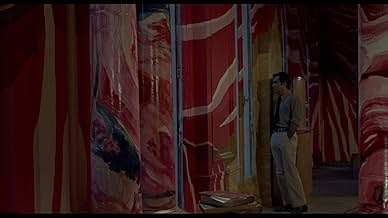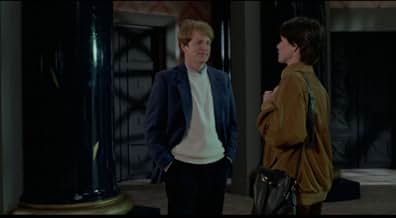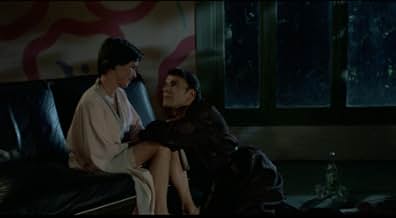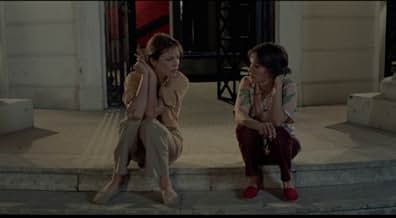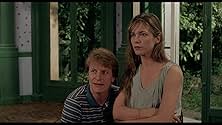Ajouter une intrigue dans votre langueA play within a play within a play within a play. Actors perform a play in a house; an audience member invites them to work in his own home improvising a play around his own life. The line b... Tout lireA play within a play within a play within a play. Actors perform a play in a house; an audience member invites them to work in his own home improvising a play around his own life. The line between fiction and reality blurs.A play within a play within a play within a play. Actors perform a play in a house; an audience member invites them to work in his own home improvising a play around his own life. The line between fiction and reality blurs.
- Prix
- 1 nomination au total
Histoire
Le saviez-vous
- AnecdotesThe film's title is a quote from Paul Verlaine.
- Autres versionsThere is also a 2 hour and 48 minute version.
- ConnexionsReferences Nashville (1975)
Commentaire en vedette
My review was written in October 1984 after a New York Film Festival screening.
Jacques Rivette's "Love on the Ground" is a gamesplaying effort that unfortunately misses its opportunities for flights of fancy, remaining an Earthbound exercise. Rivette's loyal local following and the potent box office lure of stars Jane Birkin and Geraldine Chaplin augur good results in film's French release, but U. S. distribution by Spectrafilm faces an uphill battle.
A promising opening introduces three actors (Birkin, Chaplin and Facundo Bo) performing a Sunday night play in the rooms and corridors of their apartment. Among the casual spectators, who lurk just beyond the action (immediately setting up Rivette's usual duality between what is theater and what is "real" in his film) is a playwright Clement (Jean-Pierre Kalfon) whose work is being mangled by the trio. Instead of suing them, he hires them to enact a new playh at his mansion the following Saturday, one performance only., with the fourth act to be delivered at the last moment. The two women also are invited to move into the mansion for rehearsals, and they accept.
What unfolds is a weak satire of gothic melodramas, loaded with portentous dialog and saddled with numerous rehearsal scenes of a boring play. Rivette's gimmick is to have the play be autobiographical, concerning Clement's triangular love affair with Beatrice (since disappeared) and Pual (Andre Dussolier), latter a nightclub magician who, a la Tyrone Power in "Nightmare Alley", has gone beyond tricks into truly supernatural actions. He is also at the mansion, exerting his powers ove the two actresses, who briefly hallucinate future events involving themselves.
Rivette is working in familiar territory, not only from his previous films such as "L'amour fou" and "Celina and Julie Go Boating" but elated other works by former collaborators such as Eduardo de Gregorio's "Serail". The main problem is that his characters remain mere puppets in an elaborate, contrived game holding little intrinsic interest. Having the characters manipulate each other doesn't work since the plot changes are largely arbitrary, exemplified by an unconvincing, strictly functional, violent fight between Birkin and Chaplin midway through the film.
In place of fantasy, the film relies on well-disguised cuts to create the illusion of Chaplin and Birkin seeing themselves in their hallucinations; a mysterious room upstairs which emits sound effects of the sea, birds and orchestra tuning up (about as exciting as someone playing a sound effects record) and arresting pastel painted sets at the mansion.
Within a tongue-in-cheek format poking light fun at all the role-players, Chaplin and Birkin acquit themselves well though they're a bit too old for their parts. Kalfon is suitably sinister and Laszlo Szabo contributes several funny scenes as the unctuous "pussycat" of a butler/handyman working for Kalfon. Sandra Montaigu (star of "Lucie sur Seine") has some sharp verbal exchanges as the current, disgruntled woman of the house.
Pat ending, in which many details are tied up neatly and characters indulge in a series of one-upmanship games regarding the play's finale, is self-destructive, leading the viewer to wonder: is that all this was about? Obviously, Rivette is continuing his examination of theatrical devices but that was done far better in the serious context of his best film, "L'amour fou".
Jacques Rivette's "Love on the Ground" is a gamesplaying effort that unfortunately misses its opportunities for flights of fancy, remaining an Earthbound exercise. Rivette's loyal local following and the potent box office lure of stars Jane Birkin and Geraldine Chaplin augur good results in film's French release, but U. S. distribution by Spectrafilm faces an uphill battle.
A promising opening introduces three actors (Birkin, Chaplin and Facundo Bo) performing a Sunday night play in the rooms and corridors of their apartment. Among the casual spectators, who lurk just beyond the action (immediately setting up Rivette's usual duality between what is theater and what is "real" in his film) is a playwright Clement (Jean-Pierre Kalfon) whose work is being mangled by the trio. Instead of suing them, he hires them to enact a new playh at his mansion the following Saturday, one performance only., with the fourth act to be delivered at the last moment. The two women also are invited to move into the mansion for rehearsals, and they accept.
What unfolds is a weak satire of gothic melodramas, loaded with portentous dialog and saddled with numerous rehearsal scenes of a boring play. Rivette's gimmick is to have the play be autobiographical, concerning Clement's triangular love affair with Beatrice (since disappeared) and Pual (Andre Dussolier), latter a nightclub magician who, a la Tyrone Power in "Nightmare Alley", has gone beyond tricks into truly supernatural actions. He is also at the mansion, exerting his powers ove the two actresses, who briefly hallucinate future events involving themselves.
Rivette is working in familiar territory, not only from his previous films such as "L'amour fou" and "Celina and Julie Go Boating" but elated other works by former collaborators such as Eduardo de Gregorio's "Serail". The main problem is that his characters remain mere puppets in an elaborate, contrived game holding little intrinsic interest. Having the characters manipulate each other doesn't work since the plot changes are largely arbitrary, exemplified by an unconvincing, strictly functional, violent fight between Birkin and Chaplin midway through the film.
In place of fantasy, the film relies on well-disguised cuts to create the illusion of Chaplin and Birkin seeing themselves in their hallucinations; a mysterious room upstairs which emits sound effects of the sea, birds and orchestra tuning up (about as exciting as someone playing a sound effects record) and arresting pastel painted sets at the mansion.
Within a tongue-in-cheek format poking light fun at all the role-players, Chaplin and Birkin acquit themselves well though they're a bit too old for their parts. Kalfon is suitably sinister and Laszlo Szabo contributes several funny scenes as the unctuous "pussycat" of a butler/handyman working for Kalfon. Sandra Montaigu (star of "Lucie sur Seine") has some sharp verbal exchanges as the current, disgruntled woman of the house.
Pat ending, in which many details are tied up neatly and characters indulge in a series of one-upmanship games regarding the play's finale, is self-destructive, leading the viewer to wonder: is that all this was about? Obviously, Rivette is continuing his examination of theatrical devices but that was done far better in the serious context of his best film, "L'amour fou".
- lor_
- 12 févr. 2023
- Lien permanent
Meilleurs choix
Connectez-vous pour évaluer et surveiller les recommandations personnalisées
- How long is Love on the Ground?Propulsé par Alexa
Détails
- Durée2 heures 5 minutes
- Mixage
Contribuer à cette page
Suggérer une modification ou ajouter du contenu manquant



